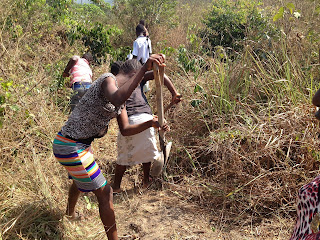A much easier way to win the battle for gender equality
The next steps to reduce gender inequalities must create
‘experiences’ for a new generation supportive of a more equal world.
 |
| EducAid Boys and girls working together to clear a stream at Mathele Bana |
‘You mould your earth when it’s wet’ goes a Sierra Leonean
adage, and I have never agreed with it more when it comes to gender equality.
The side effects of gender inequality are at the stem of many problems we face.
However, we spend billions in tick-box interventions doing piecemeal activities
to change attitudes. We comfortably sit
and watch our boys and girls grow into their parents. Gender inequalities are
present in every corner of the world. Even in countries where most progress has
occurred, being a woman is still very tough.
Gender inequalities are sustained and strengthened by our
thoughts and actions, which are heavily moulded by our childhood experiences in
home and in school. Therefore, the school and the home must be our work
stations in the fight for equality. The best possible impact must centre on
policies that create pro-equality childhood experiences through targeting the
home and the school. Adjustments in our workplaces should be complementary.
When we raise our children without significant experiences
of female leadership and learning to be supportive in an atmosphere of gender
equality, we shouldn’t be surprised that men dominate leadership roles across
the world while women stay in the shadows. Go to the remotest villages in Sierra
Leone and you will find that people are sufficiently sensitized about gender
equality and how to achieve it, but even those who seem to know the concepts
and even those who preach equality often find it very difficult to apply it in
their daily lives. This is due to the dissonance felt by adults who were raised
to think and act in gender-biased ways. We must focus our resources on
interventions that create opportunities which provide successful experiences of
an equal world. Sensitization is the first step, experiences are what influence
attitudes. Experiences that simulate a more equal world for our boys and girls
to grow up into can successfully be established in schools through many
approaches.
In schools we should:
1.
Clear the access barrier, including interventions that
target and support girls to access school, stay there, and ensure dropouts have
an alternative path to be reintegrated into the normal school system.
2.
Initiate programmes to promote shared and gender
sensitive leadership in schools. This includes un-gendering household chores
and responsibilities traditionally done by only one sex, having equal numbers
of boy and girl prefects, student council members, peer mediators, head boys
and girls and mechanisms to effectively engage them. Strategies to ensure girls
don’t sit back and allow the boys to take charge must be developed.
3.
Undertake interventions to promote gender sensitive
methodologies in classrooms, including engaging girls in all activities, and
motivating them to set and achieve learning goals.
4.
Set up and effectively run girl-only clubs (and
occasional classes) to develop their self-esteem and learn free of competition
with boys.
5.
Set up and effectively run boy-only clubs where boys
develop pro-equality attitudes and identify their own unconscious biases.
6.
Train, deploy and support strong female role model
teachers in schools to champion equality.
Alongside we should provide:
1. Systems
for qualified women to have easier access to jobs and leadership roles.
2. Incentives
like promotions, career development, bonuses and in-service interventions to
promote and develop active female leadership.
3. More
female voices in the media, as those in leadership roles can go a long way to
changing perceptions about women’s abilities.
4. Parents
and communities are sensitized through local media and face-to-face
interventions on pro-gender equality parenting and living.
I am urging NGOs and Governments to make a sharp shift from
tick-box Interventions, to focusing instead on creating experiences in schools (and homes and workplaces) that promote a
more equal world. The next step can only be achieved by modelling programmes
and interventions around simulating a more equal world for young children to
grow into. Let’s not stand by and watch that window of opportunity to create a
more equal world close right before our eyes.
Let’s support the generation that will bring equality when
they are young.
p.s. EducAid Sierra Leone, a small education-focused
organisation, running schools and improving the quality of teaching and
learning in Sierra Leone. Through its teacher training programmes EducAid has
established strong systems across its schools (and in its partner schools)
aiming to simulate a more equal world for its students to grow up in.
Visit www.educaid.org.uk to learn more
about EducAid's work in education.



Comments
Post a Comment